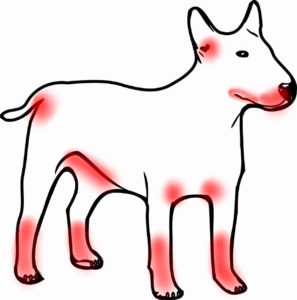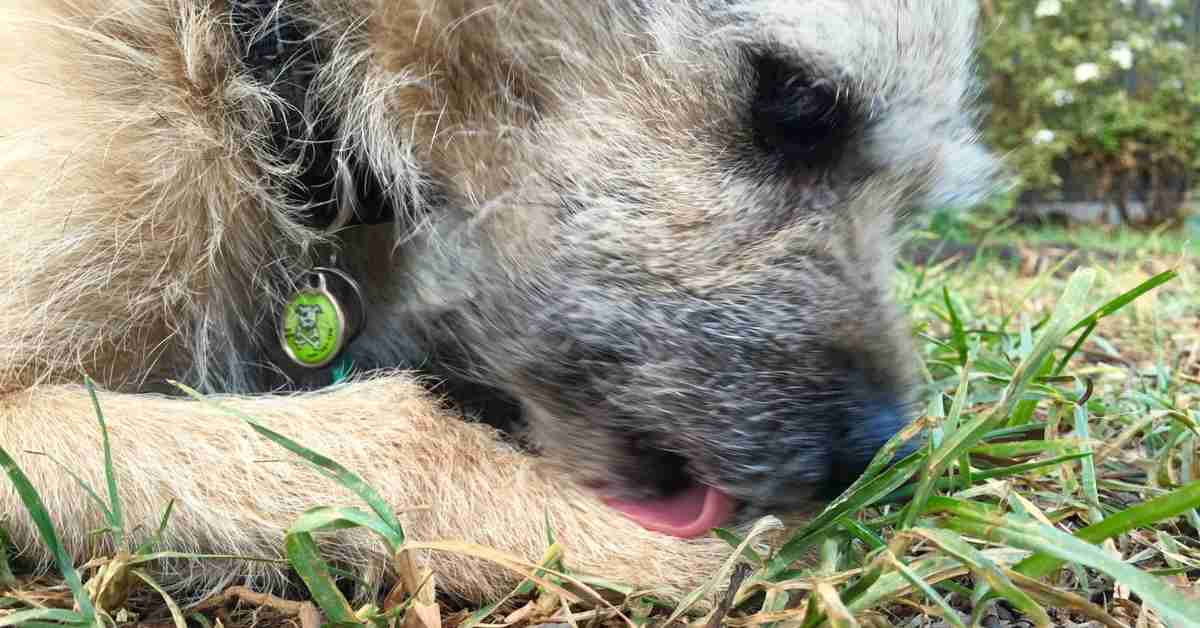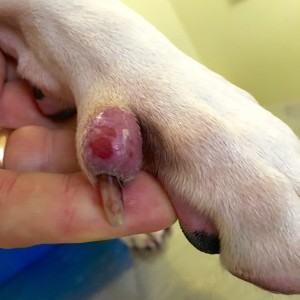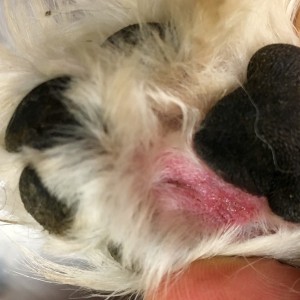Updated December 9, 2023
TLDR: the main reason why dogs lick their paws is when allergic skin disease causes itchy dermatitis between the toes. Other less common causes include
- Bacterial or fungal infection
- Contact dermatitis, trauma or burns
- Nailbed infections or tumours
- Grass seeds, stress, illness or anxiety.
Now dive deeper.
Does your dog lick or chew their feet? A little bit of foot licking can be normal, but if the hair has brown saliva staining or the skin is red, then it’s a problem.
Short-term foot licking might be caused by:
- a grass seed
- pad or nail injuries
- stings or abrasions.
These are usually easy for a vet to fix.
Long-term foot licking is frustrating.
- Sometimes it’s truly a long-term disease requiring a long-term solution
- Other times it’s a short term issue that has morphed into a vicious cycle of licking and skin damage
To help our dogs we need to understand their individual motivation. Sometimes it’s not obvious. Beware of anyone claiming to have all the answers.
Myths About Foot Licking
Later I’ll share my views, but here are some of the things you read online that aren’t accurate.
“Dogs lick their feet due to boredom”
A bored dog will probably lick more, but something has to start them licking in the first place. Foot lickers need to be kept occupied, but that’s only a small part of the solution. Overnight they will still lick and scratch if you haven’t got it right.
“Nine times out of ten, the itching is caused by allergies to inhaled pollen.”
9 out of 10 itchy dogs may be allergic, but only if you rule out fleas, mites, bacterial and fungal infections first. None of these are usually visible.
Even when allergic, the allergen may not be inhaled. Allergy studies show that it doesn’t matter how a dog is exposed to its allergen, whether it’s in the coat, on the skin, inhaled or eaten. This is important in knowing what to do, as you will read later. Read more about pollens, dust mites and other allergens of dogs here.
“Dogs that lick their paws aren’t usually suffering from a bacterial or fungal infection.”
Just because you can’t see it doesn’t mean it isn’t there. It takes extra testing to find. I get fooled by this one all the time so it’s no wonder that many non-vets do too.
“Paw licking is only seen in certain breeds.”
The grain of truth here is that canine skin allergies have a genetic element, and some breeds are more at risk than others. However, not all Jack Russell or West Highland White Terriers are allergic and even the healthiest breeds such as Greyhounds get interdigital dermatitis.
“No one has yet developed a cure for allergies.”
We can’t cure most dogs but that doesn’t mean we can’t make a big difference. Allergen Specific Immunotherapy will give some improvement in two thirds of treated dogs, and gives a complete cure in around 10%.
Similarly, new advances like Apoquel and Cytopoint are giving excellent results in many dogs.
“The idea behind giving your dog fish or fish oil is sound, but in practice it never seems to help and can often have unintended results.”
Omega 3 fatty acids help, as good science shows. The effect is weak, but if it doesn’t cause gastrointestinal upsets then why not try them?
“The main problem with medicated shampoos is that they were invented for horses and later marketed for dogs. They are industrial strength detergents and they dry out already damaged skin.”
Rubbish. Good shampoos are listed in our guide to bathing dogs and these won’t damage or dry out skin if used properly. Medicated shampoos such as Malaseb are essential for some infections. Judge them by their results.
“Try to bathe your dog as little as possible. Even the mildest shampoo can wash away natural skin oils. The best shampoo is no shampoo. The best choice is puppy shampoo with aloe vera, oatmeal, and coconut cleansers.”
‘Puppy’ is just a marketing word on shampoo bottles. The same can be true for ‘oatmeal’, ‘aloe vera’ or ‘coconut’. What’s most important is that the shampoo is soap free, balanced and made specifically for dog skin.
Choose your shampoo carefully, preferably with your vet’s assistance. If you follow our advice on our skin care page and work in cooperation with your vet, you should find frequent bathing to be an important part of managing itchy dogs.
“Creams or ointments don’t work”
It’s not that simple. Every day I see topical remedies play a big part in helping dogs with paw problems. However I also know that they can be dangerous or useless if used incorrectly. Why?
- Putting something on a dog’s feet only makes them lick more.
- Cortisone or antibiotics ointments were never designed to be ingested, and their toxicity is untested.
- Some active ingredients can be too powerful for prolonged use.
BUT with care and the use of a collar to prevent access to the area, ointments and creams can be the fastest and most effective way to help your dog. So here’s my summary of the foot licking problem.
Why Do Allergic Dogs Lick Their Feet?

Dogs with allergic or atopic dermatitis are more likely to be affected in particular places. The best guess is that the combination of a slightly warmer and moist environment makes the skin a bit itchier. Other places include:
- In the ears (see our article on ear infections).
- In the armpits and groin.
- Under the tail.
- On the chin (notice that this is the odd one out).
What Else Causes Dogs To Lick Their Feet?
- Allergic disease is number one, but we do see other causes.
- Grass seeds are very common in spring and early summer- read more here
- Malassezial or staphylococcal infection is common and easily overlooked. While often secondary to allergy, dogs won’t get better if it isn’t controlled.
- Nailbed disease. We see infections, and tumours commonly.
- Illnesses like heart disease or chronic pain can cause dogs to chew at themselves. A common example is when impacted anal glands need emptying. Rusky improved when we controlled his arthritis better.
- Anxiety or Stress can increase foot licking but it isn’t as common as believed.
- Pad damage from hot pavement or overexercise.
- Licking! Did you know that dog saliva and licking are harmful? By the time I see many dogs with interdigital dermatitis the cause isn’t obvious any more. The constant licking only damages the skin more and introduces infection.
What Can Stop Dogs Foot Licking?
It’s helpful to think of foot licking as a skin problem exacerbated by behaviour. Here’s what we suggest:
- Visit our page on dermatitis and skincare and look especially at the links on home remedies and modern veterinary treatments. These wholistic approaches treat the skin as a unit and recognise that the feet are just the visible sign of a larger problem.
- Encourage distractions and extra exercise. I give my atopic dog more raw bones during his itchy season.
- Don’t be tempted to rely on anti lick bitter sprays. These almost never work and aren’t treating the cause. Then read why vets don’t recommend tea tree oil for itchy skin either!
- See your vet. They can help diagnose the cause and then prescribe extra treatments such as:
- Antibacterial or anti fungal therapy.
- Topical creams, sprays or ointments.
- Cortisone injections or tablets (especially if used short term).
- Newer treatments such as Atopica, Apoquel or Cytopoint.
Read more about how your vet can help itchy dogs and foot licking here.
Have something to add? Comments (if open) will appear within 24 hours.
By Andrew Spanner BVSc(Hons) MVetStud, a vet in Adelaide, Australia. Meet his team here. The information provided here is not intended to be used as a substitute for going to the vet. If your pet is unwell, please seek veterinary attention.




Hi Andrew, my 2.5 yr old mini dachshund’s is always licking his left hind paw and he doesn’t like to bear weight on it. It has an area on the main pad that is black in colour and swollen or thicker and there is inflammation/bleeding along the length of the hairline at the base of main pad adjacent to where the blackness and thickness is. From what I’ve read it appears to be hyperkeratosis. Is there another alternative explanation? He hasn’t been using the pad excessively. He is currently wearing a cone to stop him licking at it and I am using diluted betadine ointment daily where it is raw.
Hi Joanna. I suspect that a large part of the problem is now due to the licking. A lot of these cases respond to disinfectants or antibiotics and creams, as long as they can be prevented from causing more damage. Only your vet can say what might have caused it.
My blue English Staffordshire constantly licks his feet , I have tried malaseb and cleaning every second day . He is on medication and eats a sensitive skin dog food but it hasn’t changed they are red raw and he is now limping , only using three legs he refuses to put his front right leg down . I have been told he has a skin condition but still cannot manage to pin point what it actually is . Please some one help .
Jesse.
Hi Jesse. It sounds like you’re doing everything right so I’m sorry it’s not working for your dog. It’s a long shot but make sure he’s had a skin scraping for demodex mites, and I would suggest using a cone so that creams on his feet can work better without being licked off. Other than that, all I can suggest is to keep trying different combinations until you get it right.
We suspect our dog has either hurt his paws on hot asphalt or maybe from running in wet grass for too long. (Possible grass allergy.)
He rolls around in the grass hard and he’s red and bumpy all over his tummy, chest, arm pit and groin.
He won’t stop licking his paws and they are gross. Should we use ointment and wrap them and use a collar?
Please help!
Hi Topher. A collar is never a bad idea when a dog is excessively licking the feet, and then ointments won’t get licked off either. Wrapping on the other hand will make it worse. The bumps on your dog’s underside are almost certainly caused by a bacterial infection of the hair follicles called superficial pyoderma. It makes me wonder if that’s also affecting the feet – this only responds properly to systemic antibiotics. The trick with these dogs is to deal with secondary infections and then deal with underlying allergies, parasites or any other causes. I’m sorry there’s no easy solution.
Very helpful thanks.Re dogs licking paws.
Is giving your dog with a yeast intolerance is it bad to give pasta and rice, im up to feeding my poodle cat food ive cooked her food and she eats a lot of protiene in meat evey day, im just about over this hot spots and fungal infections treated with fungal ointment is good but it is continual what can i do ive tryed raw meat, vegetables pasta rice and still she licks her feet and scratches unless she is bathed every 2nd day in the hummidity and the softest shampoo used cut her coast to nill and still she scraches and licks her feet and she has often eay infectin sfrom humiditty, i clean her eays evey day at these times do i give her cat food she likes and will eat that ??
Many Thanks
Pamela Smith
Hi Pamela. It’s never a good idea to give cat food to dogs as it’s generally too rich for them. As far as whether the food is causing the skin problem, click the link to learn more.